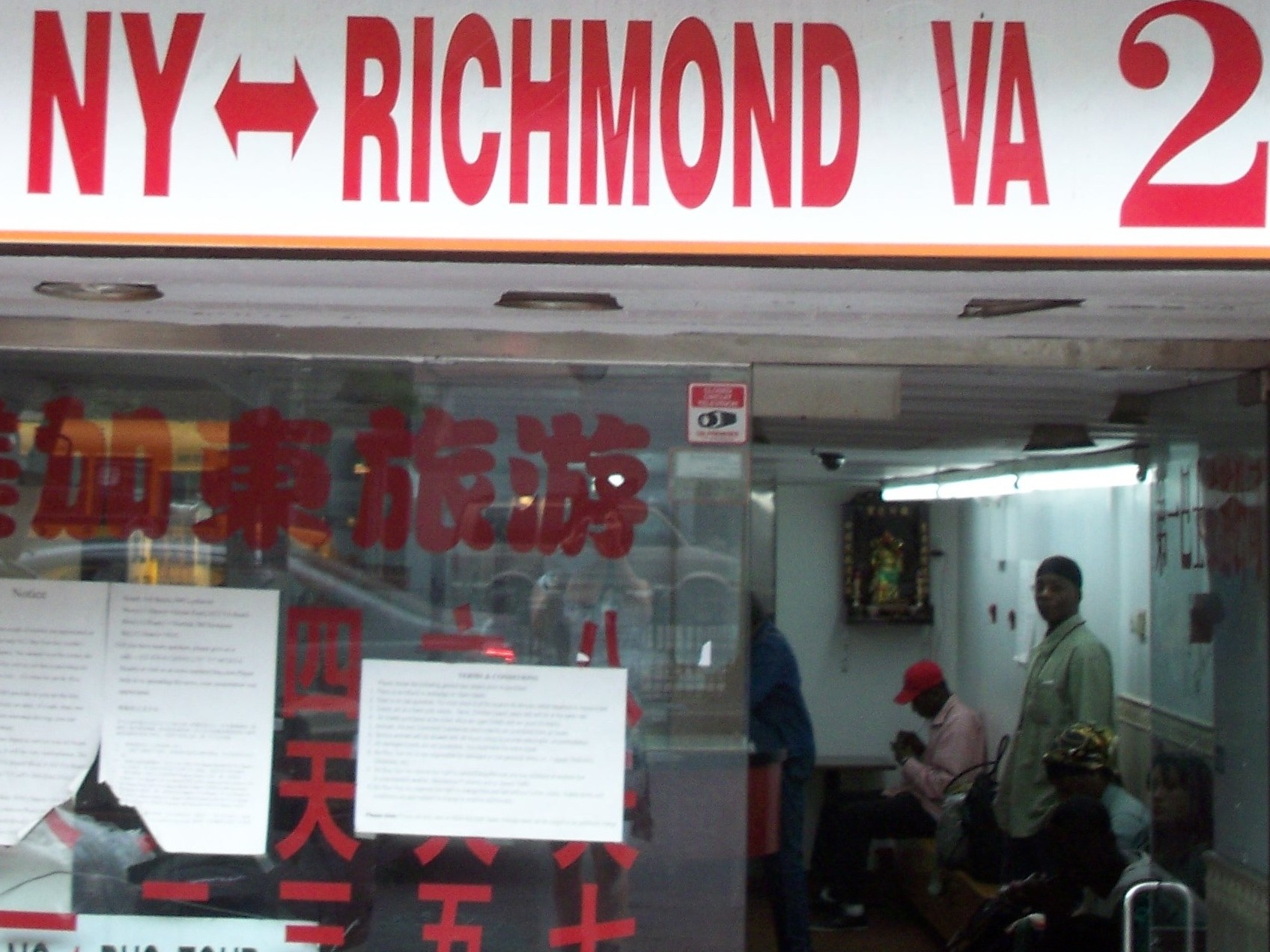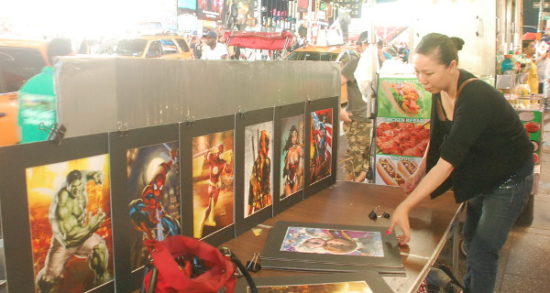“It’s warfare against Chinese companies.”

June 4, 2012
On Wednesday, May 31, the Department of Transportation shut down 26 Chinatown bus companies for safety violations. The action was primarily targeted at three companies—Apex, New Century, and I-95—for violations that ranged from lack of proper commercial licenses to illegal overtime hours. The three companies controlled a network of other companies, including 13 which had already been shut down but were continuing to operate.
The inevitability of government regulation had been building over the past year, as increased scrutiny followed a string of deadly bus accidents, including the March 2011 casino bus crash which killed fifteen people. In April, a story surfaced about drug traffickers using the affordable Chinatown buses to transport kilos of cocaine and meth.
The day after the shutdown, I took a walk around Chinatown. The sidewalks did seem emptier, but if I hadn’t known about the shutdown, I wouldn’t have noticed. Outwardly, it seemed as if little had changed, but I did not know the extent of the anger and frustration brewing underneath the surface.
—
My first stop was Fung Wah. Fung Wah’s offices were right off the Manhattan Bridge, where the company’s name was painted prominently in large blue and red letters on the side of the building. Fung Wah, one of the first to develop the curbside pick-up model, had not been shut down.
A long line of passengers stood waiting patiently for the bus. Everything looked ordinary. Three employees were grouped together at the end of the line, wearing their distinctive red embroidered jackets, carrying walkie talkies. Their ability to rally groups of tired, luggage-laden people to run two blocks to catch a bus was remarkable. I found their professionalism reassuring; the many times I rode this bus, I never encountered anything bad.
I walked up to one of the older employees. “Where you going?” she asked me. She repeated this question in Chinese. When I began to ask how she felt about the shutdowns, her face turned immediately cold.
“I can’t talk to you, I’m at work,” she said. “Don’t you see? I have no time.”
She repeatedly X’ed her arms over her head, as if shielding herself from flying debris. The two younger employees stared willfully into the street, in a way that suggested they had been trained to ignore people who asked questions.
I found myself surprised by this sudden hostility. I realized that it was naïve of me to take this news so lightly. An entire economy was on the line, as were many livelihoods.
—
I walked east on Canal, towards Allen, where many of the bus companies were located because it was a wider street for easier pick up. Brothers Bus. New Century. Moon Coach. The names of the newer companies were almost poetic. The offices were closed, their metal gates clean and mostly free of graffiti, probably because the gates were rarely down. (The last buses departed at 3 a.m. and started up again at 6 a.m.)
On the street, passengers whose bus tickets were no longer valid were confused, milling around with their suitcases. I walked with one woman who was from New Jersey, on her way to Virginia. “Can you tell me where Coach 88 picks up?” She had purchased a round trip ticket in Virginia and had not heard the news about the shutdown. At Coach 88’s offices on 88 Chrystie Street, she was told that the pick up was three blocks away, at Allen and Canal. There was no bus when we got there.
—
At the corner of Pike and Division, I saw a family of tourists, likely from Spain. The son of the family, clutching tickets, pointed at the sign for Apex. I knew that Apex was one of the companies that had been shut down.
In front of Apex, two men stood at the corner, smoking cigarettes. They had a hard look on their faces, which became polite the minute the Spanish tourists approached. “Yes, yes, no problem,” one of the men said. “Wait here.” He was wearing aviator sunglasses, a tan polyester shirt, linen slacks, was slouched and thin. Dressed in the fashion of the sixties—or, I thought, mob fashion.
The metal gates of Apex’s offices were still half open. I couldn’t see what was happening inside. I didn’t know if these men were Apex bus operators or random men who had come to take advantage of lost ticket holders.
“Where you going?” the man in the sunglasses asked me.
“Nowhere,” I said. “I was just walking around. What’s going on? Do you work at Apex?”
He looked me up and down, and perhaps saw the notepad sticking out of my bag.
“I don’t know,” he said suddenly. His face changed, too; he could barely hide his contempt. “I. don’t. know.”
I tried to push through his anger. I tried to suggest, in my own way, that I wanted to get his side of the story, to hear his grievances.
The other man came to see what was going on, and he seemed equally angry. They kept peering into my bag, and looking me up and down. I decided that it would be smarter for me to walk away. As I walked away, I saw the other man trailing me. I sat down on the edge of a large planter, to give him an opportunity to talk to me, if that’s what he wanted to do. We exchanged a brief look, and then he walked away.
—
I finally found a company that would talk to me about the shutdowns, though the manager did not want to be named or specified in any way. I’ll just call them Bus Company A.
“You’re not recording this, are you?” he asked.
“No, I’m not recording anything!” I said, throwing up my hands to prove my innocence, a gesture I found ridiculous.
The manager of Bus Company A thought the shutdowns were unfair. He said that transportation officials had come to their offices to check for documents and conduct inspections, but nothing was said about whether the company was doing something right or wrong. It was like taking a test and never finding out what your mistakes were, only to be told whether you passed or failed.
Luckily, their own company had passed. “We do everything the legal way,” the manager said. “There were illegal things happening with other companies, but they didn’t get a chance to fix.”
I wondered how much this manager knew about the “illegal practices” of the other companies. Surely he knew about the drivers’ insane overtime hours, the lack of proper licenses, and a general disregard for customer safety. The New York Times reported that certain companies had actually been repeatedly defiant, and even “scoffed” at the regulators when confronted about their practices.
I thought of the men standing in front of Apex, of their blind tenacity at the face of such punishing consequences. Weren’t they afraid of incurring further fines, of truly pissing off the DOT?
Perhaps the people running Apex couldn’t afford to be afraid. The manager of Bus Company A explained that such a shutdown was absolutely disastrous; these companies were operating at such narrow profit margins they could not afford to stay closed for even one day.
“They’re dead,” he said matter-of-factly.
I asked the manager if the shutdown was likely to help or harm his own business. Perhaps they would be able to absorb the customers who would have gone to the cheaper, less scrupulous companies? The manager shook his head sadly. He said that it would be more difficult to absorb other customers, because their company only serviced to select cities. He saw the shutdown as damaging to his business in the long run. The shutdown gave all Chinatown bus companies, legit or otherwise, a bad name.
“It’s warfare against the Chinese companies,” he said. “They’re not shutting down American companies. Why aren’t they getting investigated?”



